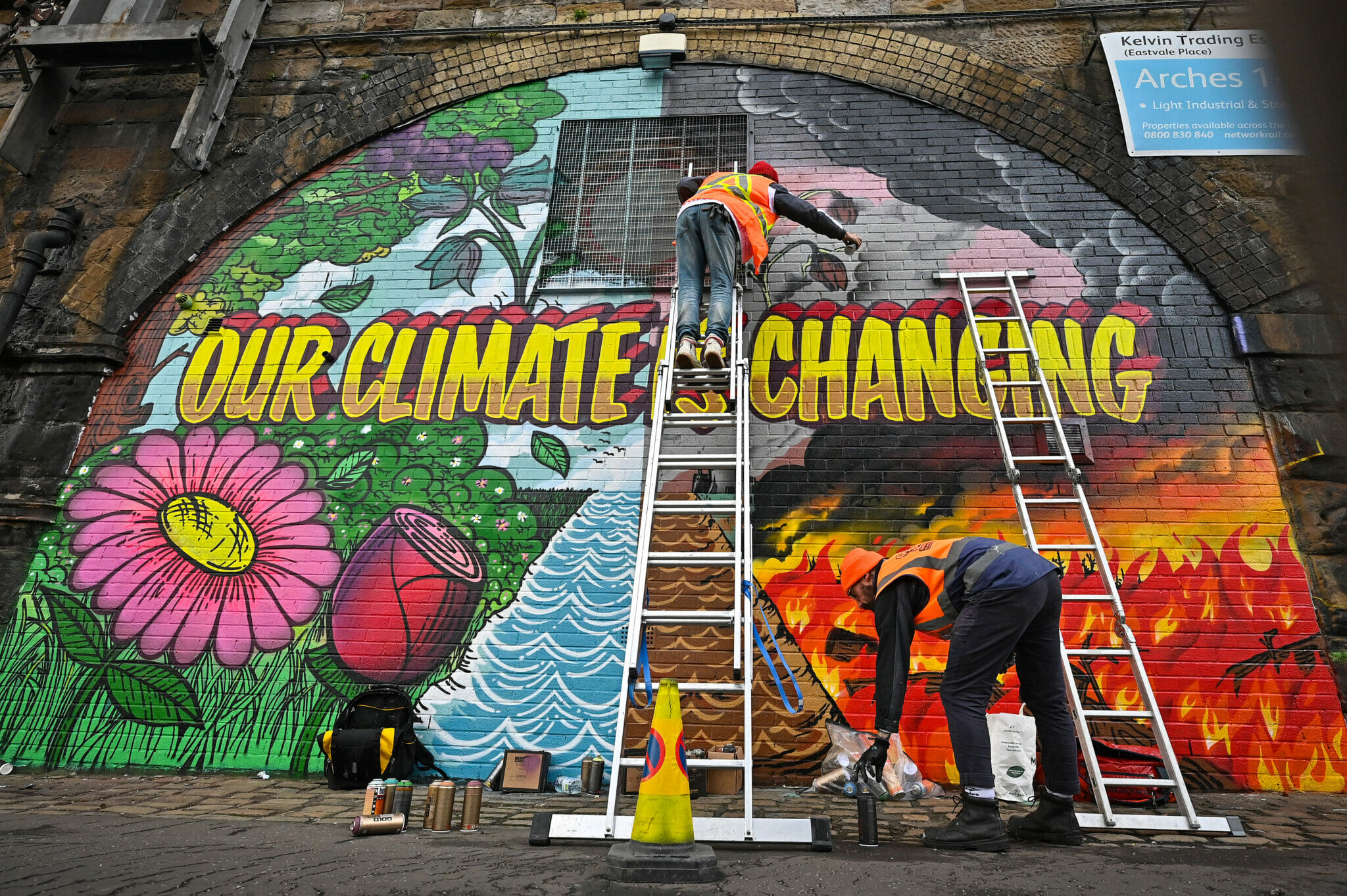Sign up to receive our weekly newsletter.
Journalists on the climate beat will begin 2022 with their work cut out for them.
In the US, we’re still awaiting promised climate legislation — desirable as a matter of science and survival, not of partisan politics. If that legislation finally passes, how federal money will be doled out across the country, who will benefit, and whether programs actually have the intended effect of reducing emissions will all be critical areas for journalistic scrutiny.
On the world stage, November’s COP26 summit delivered far better on rhetoric than on action; countries’ pledges fell well short of United Nations targets to limit global warming to 1.5 degrees Celsius, while questions of justice for developing countries, which are least responsible for climate change but often first to bear its burdens, were mostly shrugged off. Reaching 1.5 degrees C is still possible. Science is clear that if humanity acts fast to curb emissions, temperature rise will also stop quickly. To meet the 1.5 degrees C goal, accountability is key: How countries integrate emissions-reduction commitments into their domestic climate programs, how they advance those commitments in time for COP27 next November, and whether such advancements square with climate science are, likewise, questions that journalists everywhere must ask, and keep pressing.
As essential as these plotlines are, they are also wonky. So, as always, journalists must emphasize people’s lived experience of climate change — especially amongst marginalized communities and in the Global South, where the climate story is often the most vivid. “If you’ll talk to any journalist from the developing world, they’ll tell you human rights is the biggest issue for us,” Disha Shetty, a journalist in India, said during a recent Covering Climate Now Talking Shop. “If it also comes on the top of the list of journalists in the Global North, that’s going to make a difference to the larger conversation because of the disproportionate voice that they have.”
For all the disappointments of 2021, solutions remain abundant and at hand. “That means there is always hope,” Alex Thomson, of Channel 4 in the UK, said in the same Talking Shop. “And the worst thing that journalists can possibly ever do is engender despair.” Which is to say that in 2022 hope must undergird all of our journalistic efforts, even as we hold the powerful to account.
Read CCNow’s full column on accountability in the year ahead.
FROM US
The climate story after Glasgow. Last week we held a Talking Shop to process what happened at COP26, and to discuss how to cover the climate story in the coming year. Our panelists contributed great insights relevant to all journalists. Read key takeaways.
What we’re grateful for. If you’re craving an uplifting take on climate journalism, look no further than our 2021 awards wrap. We’re so proud of the exemplary work that we honored this year, and we hope you’ll take heart from it, too! Check it out.
Enjoy the holidays! Our team at CCNow will be on break until January 3. We’re hoping that everyone can take a deep breath and savor some quiet time in the coming weeks. Wishing you and yours peace and love.
ESSENTIAL STORIES
Tornado climate link. NBC News’ Al Roker explains how a warming climate was a “recipe for December disaster” in the US heartland last week. Via NBC News meteorologist Kathryn Prociv and the TODAY show…
* Climate scientist Michael Mann also discusses the “underestimated” impact of climate change on extreme weather events. From MSNBC….
Postcards from the edge. The New York Times offers snapshots of how climate change is affecting every country on earth in a tour de force marred only by the mistaken assertion that humanity “can’t stop” climate change. (We absolutely can, quickly, as Scientific American has explained.) Short stories with photos, videos, and sound show the impacts of climate change in 193 countries. From The New York Times…
Revealed. Russia, one of the chief laggards at COP26, has been exploring for oil and gas near Antarctica — despite a mining ban that began in 1998 — and its apparent discovery of massive deposits in the Southern Ocean could doom the 1.5 degrees C temperature goal. By Tiara Walters at South Africa’s Daily Maverick…
About face. Contrary to its public assertion, the Biden administration was NOT legally required to auction offshore oil and gas drilling rights in the Gulf of Mexico. The sale, the largest in the gulf’s history, took place just days after COP26. By Oliver Millman at the Guardian…
Forest for the trees. Viscose rayon is marketed as eco-friendly because it comes from trees, but those trees are planted in cleared rainforests in Indonesia. By Andy Lehren, Didi Martinez, Anna Schecter, and Rich Schapiro, in partnership with the Pulitzer Center’s Rainforest Investigations Network, at NBC News…
10 charts. A year in review of the climate business beat in 10 charts, tracking sustainable debt products, renewable energy, electric vehicle sales, and more, including how they’re faring towards the goal of decarbonizing the global economy. By Nathaniel Bullard at Bloomberg Green…
REPUBLICATION RECOMMENDATIONS
The following stories deserve special consideration for republication by CCNow partners:
- How Big Oil Rigs the System to Keep Winning — Earther
- An Indigenous community in India’s Meghalaya state offers lessons in climate resilience — Mongabay
For partner outlets: To submit stories for sharing, please use this form. Instructions for republishing and the full list of stories available for republication can be found in our Sharing Library.
ODDS & ENDS
Jobs. The Mississippi River Ag & Water Desk is offering $5k annual stipends to five print, radio, and multimedia expert journalists to act as occasional project leaders and reporters. It is also partnering with 10 newsrooms through Report for America, which is now hiring full time environmental reporters. NPR has a fellowship for an environmental reporter. DeSmog is looking for freelance editors for daily news and investigations on climate and energy. Email editor@desmog.com with interest, experience, availability, and desired rate.
